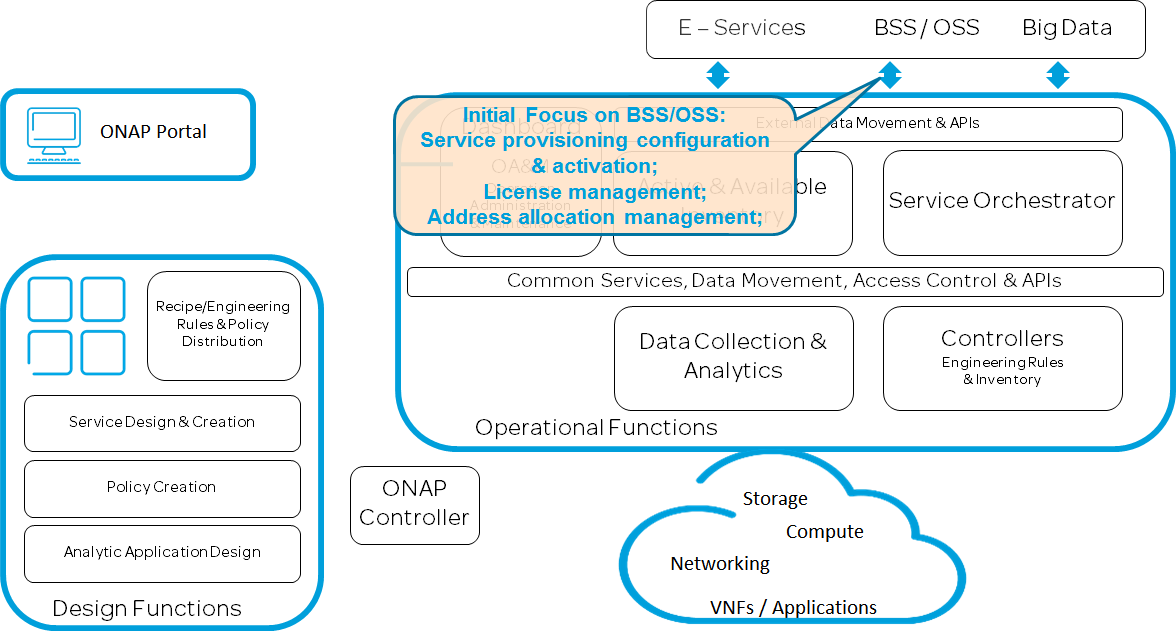...
- Deliver points of interoperability between ONAP and External Systems
- Initial focus on ONAP APIs to BSS/OSS
- May support the following capabilities:
- Service feasibility;
- Service provisioning configuration & activation;
- Usage events & metrics;
- License accounting;
- Service performance & quality;
- Service Trouble management;
- Service policy;
- Capacity engineering;
- Address allocation management
initial focus is likely to be: “Service provisioning configuration & activation”, "License management", and “Address allocation management”
Definition of Use Cases, Interactions, and Information Model engaging service providers and BSS/OSS vendors
- API development (in conjunction with specific ONAP component projects)
- Well defined specifications for the NB APIs (e.g., JSON Swagger).
- ONAP implementation of these APIs
- Model Driven approachWork with Modeling project to explore a Model Driven approach: a cohesive way to have a shared view of information across ONAP external interfaces that can be used for or be input into a model driven process whereby the cost of delivering platform functionality is drastically reduced and the time to delivery is dramatically decreased.
- Explore use of Model Driven Tool Chain to automatically generate APIs based on models
- Main deliverables of this project may include: User Stories; Use Cases and Interactions (e.g., UML); Information Models (e.g., UML); Data Models (e.g., JSON); Interface Profiles and Functional Definition; ONAP Component Mapping and Functional Analysis.
...
- How does this project fit into the rest of the ONAP Architecture?
- What other ONAP projects does this project depend on?
- This project will also analyze the functionality of the implemented set of APIs in ONAP components that are relevant to providing the described external interface functionality. Mapping and alignment between this project and the ONAP components implementing the supporting APIs is essential since functional API gaps and potential enhancements will be identified based on the functional analysis. This project also allows the pertinent ONAP component specific external API artifacts (e.g., JSON/Swagger) to be collected and referenced.
- Define external API capabilities to support the Change Management project
- Will work with the Modeling project to: identify overall modeling guidelines and approaches, determine modeling tools and tool chaining, and identification of industry standard models (e.g., TMF SID, ONF TAPI, etc.) that may be applied to the APIs
- Service Orchestrator: Will work closely with the Service Orchestrator team to gather information about the relevant Service Orchestrator APIs (particularly the Service Instantiation API). Will collaborate with Service Orchestrator team to ensure that APIs remain consistent for R1.
- External APIs team will work closely with the Standards Coordinator as there will be related activities in the TM Forum, MEF, etc.
- Align with ONAP Use Cases
- A&AI
- DCAE
- SD&C
- Controllers
- DMaaP
- Reference VNFs (related Use Cases)
- What other ONAP projects does this project depend on?
- How does this align with external standards/specifications?
- Work with Modeling project to determine base service abstraction Information Model on best in breed standard models (e.g., MEF 7.3 Service Info Model, etc.)
- MEF LSO Legato (MEF 7.3 Service Info Model)
- TM Forum Zoom effort and related TM Forum APIs where applicable. TM Forum APIs to consider include:
...
- link to seed code (if applicable)
- Potentially the Service Orchestrator's Service Instantiation API
- Vendor Neutral
- This project is vendor neutral and open-sourced under the Apache license from the OPEN-O project
- Meets Board policy (including IPR)
...
